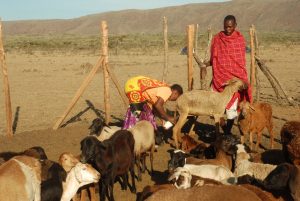SwedBio works to include an equity, democracy and rights perspectives in all its activities. SwedBio emphasizes a human rights-based approach (HRBA), as one of its cross-cutting principles and has developed an HRBA Policy.
The HRBA framework analyses power structures and aims to empower people (rights holders) so that they can be aware of their rights and able to demand them.
Additionally, it aims to analyse the responsibility and obligation of states, their institutions, and non-state actors (duty bearers) to strengthen their capacities to fulfil their particular obligation and responsibility towards the rights holders.
HRBA is grounded on human rights standards and principles of non-discrimination, participation, transparency and accountability. The approach is a tool for uncovering and fighting discrimination and amending unjust distribution of power. It includes and highlights marginalised peoples’ perspective, gender equality, and the empowerment and protection of vulnerable groups.
Those principles, as well as the human rights principles of indivisibility, interdependence and interrelatedness, provide a framework for SwedBio’s partnerships. SwedBio seeks to engage with partners that focus on the structure and causes of discrimination and inequalities, which keep the marginalised groups in poverty and excluded. This is done by applying the HRBA principles as guidance, goal, and also as an outcome in SwedBio’s work.
Within the HRBA framework, power relations involve people claiming their rights, entailing that all people are rights holders with no distinction. Therefore, SwedBio seeks to associate with organisations able to enhance the capacity of right holders to exercise their rights, as well as organisations that are able to assist duty-bearers in building capacity to fulfil their own obligations which entail respect, protection and fulfilling the rights of all.
Within SwedBio’s policy work, the HRBA, as a cross-cutting principle, plays a significant role in steering towards sustainable changes aimed by the 2030 Agenda for Sustainable Development and the Sustainable Development Goals. We are also working towards the integration of an HRBA in the post- 2020 Global Biodiversity Framework, in order to enable the changes needed for ensuring conservation, sustainable use, and fair and equitable sharing of the benefits of the world’s biodiversity, leading towards the 2050 vision of a world living in harmony with nature.
Respect for and promotion of Indigenous and local knowledge helps in the realisation of human rights, self-determined development, and culturally appropriate pathways for strengthening local resource management, livelihoods and well-being. Inclusion of Indigenous peoples and local communities and their knowledge in decision-making contributes to increased attention and respect for the different knowledge systems, and thus for support to its influences on practices and policies.
By and large, SwedBio applies the HRBA principle to all its partnerships and activities and intends to encourage and support the voices of rights holders, especially vulnerable and marginalised groups in decision-making. We prioritise collaborative partners whose focus is to connect human rights, biodiversity and healthy ecosystems, guided by our HRBA policy.

 SwedBio's Human Rights-Based Approach policy
SwedBio's Human Rights-Based Approach policy